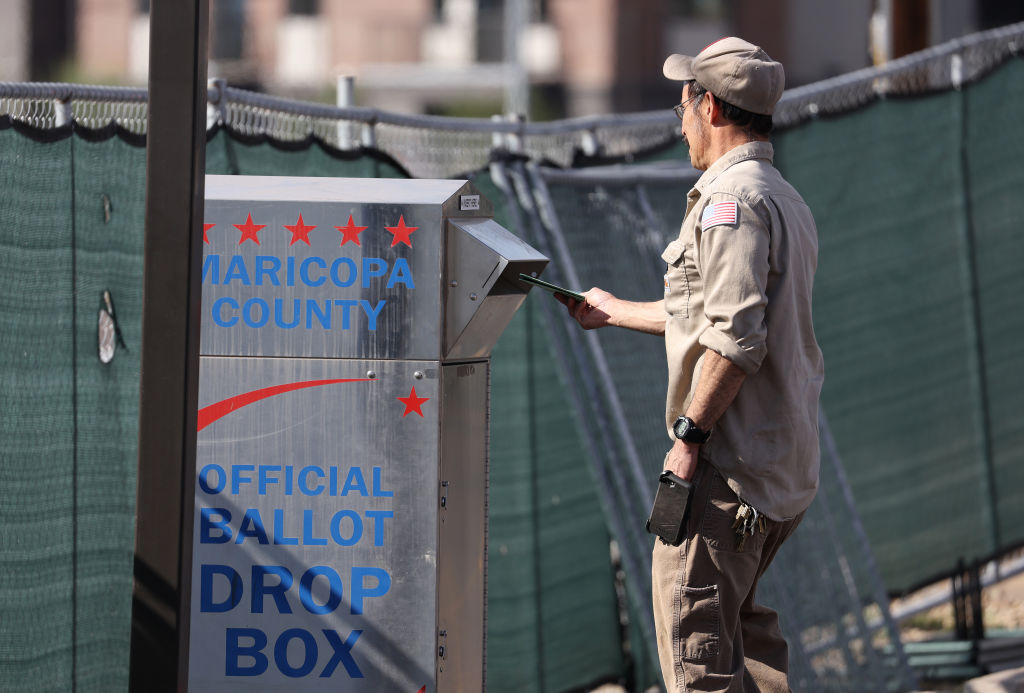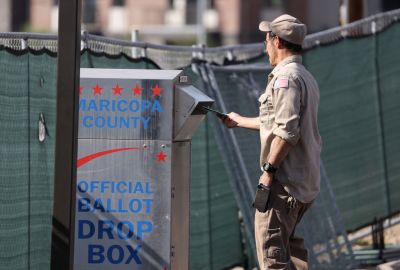Fueled in part by Elon Musk’s repost on X (formerly Twitter), an image detailing the supposed rarity of mail-in voting has gone viral on numerous social media platforms. In the post, some countries including France, Mexico, and Belgium are listed as having banned mail-in voting from the 1970s onward because of fraud.
The post—which is likely based on an August 2021 paper published by John Lott of the Crime Prevention Research Center—is mostly correct, though there are some inaccuracies and some context is missing.* Most of the countries identified do not permit mail-in voting for in-country voters. However, many do allow postal voting for citizens living abroad.
Additionally, the post selectively omits many democratic countries that do allow mail-in voting. For example, according to an October 2020 report by the International Institute for Democracy and Electoral Assistance, six European countries permit postal voting for some voters, and seven—including the U.K., Germany, and Poland—allow postal voting for all voters. Outside of Europe, multiple other countries including Canada, Australia, and New Zealand all also allow some or all voters to submit ballots via post.
Here is an overview of mail-in voting laws for each of the countries mentioned in the post.
France banned mail-in voting in 1975 due to fraud.
True.
It is true that France does not use mail-in voting in its presidential elections. Voting by mail was abolished in the county by the French Parliament on December 31, 1975, primarily due to instances of fraud in Corsica during the mid- to late-1960s.
Today France utilizes a system of paper ballots, all cast in person and counted by hand—though voters serving prison sentences or being held in detention have been allowed to vote by mail since 2021. Additionally, voters who will be absent on election days can also designate a proxy voter to vote for them. A bill to allow mail-in voting was introduced in 2020 during the COVID-19 pandemic, but it was unsuccessful.
Mexico banned mail-in voting in 1992 due to fraud.
Partly true.
Mexico does not currently allow postal voting in its elections for domestic voters, though Mexican citizens living abroad can vote via mail, electronically, or in person at foreign voting stations. Because of its long history of electoral corruption and fraud, the country requires a special ID card for all voters, which can be obtained for free from the county’s National Electoral Institute.
Mexico did not specifically ban postal voting in 1992 due to postal-voting fraud, however. In 1989, the Mexican Institutional Revolutionary Party (PRI)—which had never lost a presidential election since the 1910 Mexican Revolution—passed an electoral reform package after many Mexicans suspected fraud in the country’s 1988 election, but this was not directly tied to postal voting. In 1993, an additional modification of the county’s electoral law was passed in order to increase confidence in the legitimacy of the upcoming 1994 election. The package introduced more robust voter registration and vote counting systems as well as a number of other related reforms.
Belgium banned mail-in voting in 2018 due to fraud.
False.
As of 2024, mail-in voting is not available to most voters in Belgium—though citizens living abroad can cast an absentee ballot via post from both inside and outside the European Union. Belgian nationals abroad can also vote in person at a consulate or designate a proxy to vote on their behalf.
Postal voting was not banned in Belgium in 2018 because of voter fraud, however. A prominent case of electoral fraud did occur in the Belgian city of Neufchâteau in 2018, but this case did not relate to mail-in voting. Instead, the case involved a small number of proxy votes originating from a local retirement home. Twenty two people were indicted in the incident.
Sweden does not permit mail-in voting.
True.
In Sweden, postal voting is allowed for citizens residing abroad. Domestic voters are allowed to vote by courier if they qualify for reasons including old age, illness, or impairment. When voting by courier, both a witness and a messenger are required to be present for the vote, and the messenger must deliver the voting documents in a special envelope.
Italy does not permit mail-in voting.
True.
Italians living within Italy do not have the option to vote via post. However, citizens living abroad may vote by mail. Due to declining voter turnout in recent Italian elections, a parliamentary committee proposed in 2022 that the country introduce a form of postal voting.
Ukraine does not permit mail-in voting.
True.
In Ukraine—where elections have been suspended indefinitely since the Russian invasion—postal voting is not permitted for either domestic citizens or those residing abroad. Ukrainian expats have the opportunity to cast ballots at consulates located in foreign countries, but this must be done in person.
Russia does not permit mail-in voting.
True.
In July 2020, Vladimir Putin signed a law allowing for the county’s election commission to conduct elections and referendums via post and the internet. However, postal voting was never actually implemented. In the 2024 Russian presidential election, many voters in the country instead cast ballots online.
Japan does not permit mail-in voting.
Partly True.
Japan does not allow postal voting for most citizens, but it does allow for mail-in voting for individuals with certain disabilities (the country expanded this qualification to include COVID-19 patients in 2021). Additionally, overseas voters are permitted to vote by mail or at foreign embassies.
No Middle Eastern or Latin American countries permit mail-in voting.
True.
According to data from the International Institute for Democracy and Electoral Assistance, in-country postal voting is not available in any Middle Eastern or Latin American countries, though some do accept absentee ballots via post from citizens living abroad.
Does mail-in voting increase voter fraud?
While voter fraud does take place at varying levels in countries across the globe, research on postal voting in the U.S. has not shown significant increases in fraud and numerous security measures are taken in states to ensure mail-in ballots are legitimate. Likewise, researchers at Stanford University’s Institute for Economic Policy Research found in an April 2020 study that there was no partisan advantage associated with voting by mail for elections between 1996 and 2018 in the states it analyzed, meaning neither the Democratic nor Republican party benefited more than the other from postal voting.
When voter fraud does take place in the U.S., it is generally at a small scale and is relatively localized. The most prominent case in recent years occurred in 2018 in North Carolina’s 9th Congressional District race when Leslie Dowless Jr., a campaign operative for Republican candidate Mark Harris, ran an illegal “ballot harvesting” operation in the state. Dowess and his team illegally gathered and submitted absentee ballots from voters, and workers reported being instructed to forge signatures and fill out votes themselves on incomplete ballots. Absentee ballot irregularities were identified by the state, however, and the North Carolina State Board of Elections ordered a new election to take place.
Correction: This article originally gave the incorrect date for a research paper published by John Lott.
If you have a claim you would like to see us fact check, please send us an email at factcheck@thedispatch.com. If you would like to suggest a correction to this piece or any other Dispatch article, please email corrections@thedispatch.com.







Please note that we at The Dispatch hold ourselves, our work, and our commenters to a higher standard than other places on the internet. We welcome comments that foster genuine debate or discussion—including comments critical of us or our work—but responses that include ad hominem attacks on fellow Dispatch members or are intended to stoke fear and anger may be moderated.
With your membership, you only have the ability to comment on The Morning Dispatch articles. Consider upgrading to join the conversation everywhere.